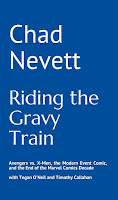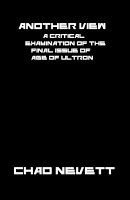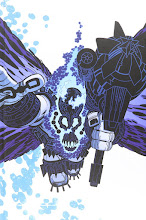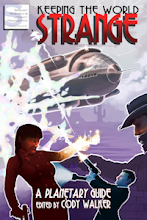In Kirby’s Eternals series, the idea of the Eternals and Deviants as enemies is shunted to the side fairly quickly. When the series begins, there is animosity in the cold war state that the two sides share, and that is put aside as the Celestials return to the Earth as the Fourth Host. Under Arishem’s watchful eye, the people of Earth have 50 years before judgment will be rendered on their survival. Immediately, Eternals, Deviants, and humans begin to shift their focus as a core group representing each race works to bring them all together in harmony, theorising that that is the only way that they can possibly survive judgment. Before Eternals became something akin to ‘just another superhero book’ seemingly under editorial pressure, there’s a few issues where the hard work of cultural exchange and understanding is underway. A shared threat and a vague hope that peaceful harmony is all that will save them has three races take the first steps towards putting aside generational conflicts. A god that unifies rather than divides. Man, Kirby was a little nuts sometimes, am I right...?
Judgment Day is basically the same idea with a few twists: the addition of mutants as a fourth race despite an effort to conflate them with Deviants; the Celestial in question is created by Earthlings; the judgment is only a day; and we get to see the judgment and get a possible understanding of the criteria. In some ways, it’s possible to read Judgment Day as Kirby’s Eternals on fast forward – and with more death, destruction, and hitting.
That is to say that, before we get into things, I enjoyed Judgment Day quite a bit. In the broad strokes, it is very much an Eternals story with the X-Men and Avengers grafted on. But, like the greatest event writer of all time, Jim Starlin, the additions to the core plot are so well done that you don’t notice/mind that they are extraneous. You can quite clearly see how this began as an Eternals story and was expanded into an event and I would argue that that is partly what makes it great. Many events feel like stories that come out of nowhere and are forced upon the characters; this one grew out of a series to such an extent that it enveloped the others.
And I have a feeling that I will have a chance to touch on that particular idea in greater depth when the Omega issue comes out...
*
There’s a point about halfway through Judgment Day issue six where it felt like things had gone too far. Like so much had been done to stop the Progenitor from destroying the planet that it seemed like a foregone conclusion. Now, the Earth was not destroyed. In fact, everything was restored to before the judgment began and the Progenitor died, having never been created, in a sense. The entire issue hinges on that moment where the end seemed certain and, then, the day was saved. Since reading the issue, I’ve quietly been pondering that moment and if it actually works for me. That delicate balance of pushing things to the brink and, then, pulling them back... did Gillen pull it off?
In a structural way, yes. Three people speak to convince the Progenitor to stop killing the planet and restore things: Ajak, Jean Grey, and Tony Stark, in that order, which is the reverse order of the three one-shots that bridged the gap between issues five and six. That it was these three characters addressing the Progenitor feels organic given their central role in the one-shots leading to this issue – after all, why did Gillen choose to highlight those characters rather than, say, Wolverine or Sersi or Sinister?
More than that, each of them pose a question to the Progenitor that comes directly from their judgments in those issues. After the Celestial says that everyone deserves to die, Ajak agrees and asks “...but do you deserve to kill us?” while Jean Grey acknowledges that she destroyed a planet as the Phoenix: “Once you’ve done this, it’s done, and you have to live with it. Can you?” After the Progenitor begins to waver, Tony addresses its concern that it may be too late by telling to do what he does: “I get out of my depth? I try to make amends? What can you do? Do that!”
Three questions borne from the Progenitor’s judgment of these three people that turn everything around:
Is the Progenitor qualified to make this judgment?
If so, will the Progenitor be able to stand by that judgment after the sentence is complete?
If not, what can it do to stop?
Each question leads to the next and, in a sense, leads the Progenitor to sacrificing itself to put everything back. When I first read it, it seemed too elegant and smooth in how the scene moved from Ajak to Jean to Tony with the Progenitor seemingly swept up in the current. It’s like once Ajak asked her question, the Celestial’s will to act was undone with the other two moving it into a specific position. Intellectually, it made sense and is quite well done; emotionally, it left me cold and unsatisfied. But, that was then. Walking through it now, the elegance is still there, while the emotional core hits harder.
“Who are the heroes here?”
This is the scene that answers that question. (Or Immortal X-Men #7.) That was the question posed back in Judgment Day #1. It was the main question of the series. It was never about the justification of existence (even though it was). This is a superhero event comic. It was always about superheroes. Heroes aren’t the folks who always do the right thing necessarily. Here, the heroes are those that fall short of their moral codes and make mistakes, and keep going, trying to make amends, make things better. Ajak admits the god she created is an unworthy, flawed one; Jean admits that she killed a planet, will never be able to make amends, but will never stop trying; Tony knows that he fucks up again and again, but each new problem is a chance to come up with another solution; and the Progenitor realises that it is a flawed god, maybe not a god at all, unable to carry out its judgment, and, instead, gives its life to undo its mistake. It sacrifices itself to save the world.
Ajak fails the Progenitor – and it accepts that judgment. Based on the criteria we have seen until this point, the acceptance of that judgment is its specific point of failure. Up until that point, the Progenitor remained true to its moral code. It judged the people of Earth and found them unworthy of further existence. All efforts to stop its judgment failed or were about to fail. That feeling of inevitability that I spoke of was the Progenitor passing its own test. The words of Ajak, Jean, and Tony prompt it to second-guess itself and begin to waver. At that point, the Progenitor fails and becomes unworthy of living further. It narrates about not being a god and Gillen, wisely, refrains from stating something best left unsaid in the comic:
The Progenitor fails godhood by choosing to be a hero.
Despite its moral failings, it tries to save as many people possible and gives its life to do so. It does this despite the immense fear and shame it feels. It does this despite every natural instinct telling it that it should kill the planet and be done with all of this.
“Who are the heroes here?”
I’d argue that the Progenitor is one by the end.
*
At some point in this event, I kept thinking about “All Good Things...” the final episode of Star Trek: The Next Generation. A double-length episode, it features three timelines where Captain Jean-Luc Picard’s conscious mind seems to jump between his bodies in each of these time periods: just before the first episode of the show, the current time in the series’s run, and a potential future. Near the end of the episode, the efforts of Picard to save humanity from a spatial anomaly that moves backwards through time, growing bigger the further into the past you go, seem to fail. Throughout the episode, he’s been helped/hindered/taunted by Q, a godlike being that Picard first encountered in the first episode of the series when he and members of his crew were put on trial for the crimes of humanity. At the end of that episode, it seemed like they had proven humanity’s worth despite Q returning throughout the series to torment/toy with them, Picard especially. When it seems like the efforts to stop the anomaly that will prevent life from Earth from beginning have failed, Picard finds himself in Q’s court, head in his hands, and Q talks to him. It becomes apparent that Picard managed to save humanity and says that he hopes that this is the last time he’s in this court, to which Q responds, “You just don’t get it, do you, Jean-Luc? The trial never ends.”
“The trial never ends.”
Those words just kept coming back to me when it became obvious that the judgment was still going on despite the Progenitor saying that it was finished and the planet will die. They were practically ringing in my ears as I read the final pages of this issue as the Progenitor narrated over Ajak Celestia greeting the dawn and holding her thumb in a position of judgment. Despite the event acting as the whole of Kirby’s Eternals in a condensed form, once again, the judgment of a god hangs over the planet. Be it Arishem, the Dreaming Celestial, the Progenitor, or, now, Ajak Celestia, the trial never ends.
It’s both a fitting way to end the event – and an honest one. Despite everything, little changes. Sersi is dead, Ajak is a god now, the Eternals are the new mutants in the hated and feared sense, the mutants have won a bit of goodwill but so have Orchis... there is progression, but, largely, much is the same now as it was when Judgment Day began. And that’s fine. It’s fine. Even the promo blurb for the Omega epilogue issue seems to get the joke: “After events, we make promises. ‘Nothing will ever be the same again.’ For the Eternals, it’s a lie. It’s always the same and always will be.” That could have been a larger statement about superhero universes. The details change; the larger concepts remain frozen in place. And, as I just said, that’s fine. That’s a feature not a bug.
The idea that an event has to change everything and leave every character in a brand new place is a misguided one. My favourite event, The Infinity Gauntlet, did the exact same thing that Judgment Day does. Almost everything is put back into place and the core characters that the writer is interested in are left in different places. That event killed half of the universe and, by the end, the only things that had really changed were Thanos was a farmer and Adam Warlock had the Infinity Gauntlet. This event killed most of the planet and, by the end, the only things that have really changed are Sersi is dead and Ajak is a god.
The important things are that it felt like it could change everything and that it was a good read.
That’s the way you do it.







